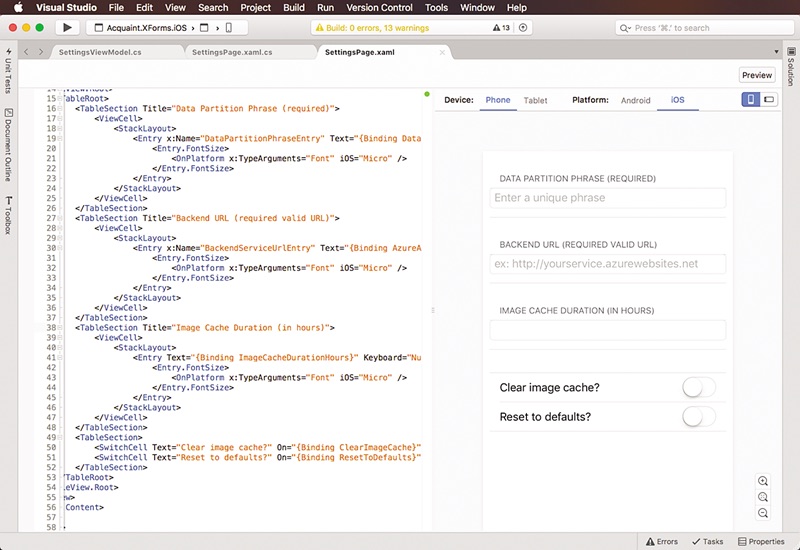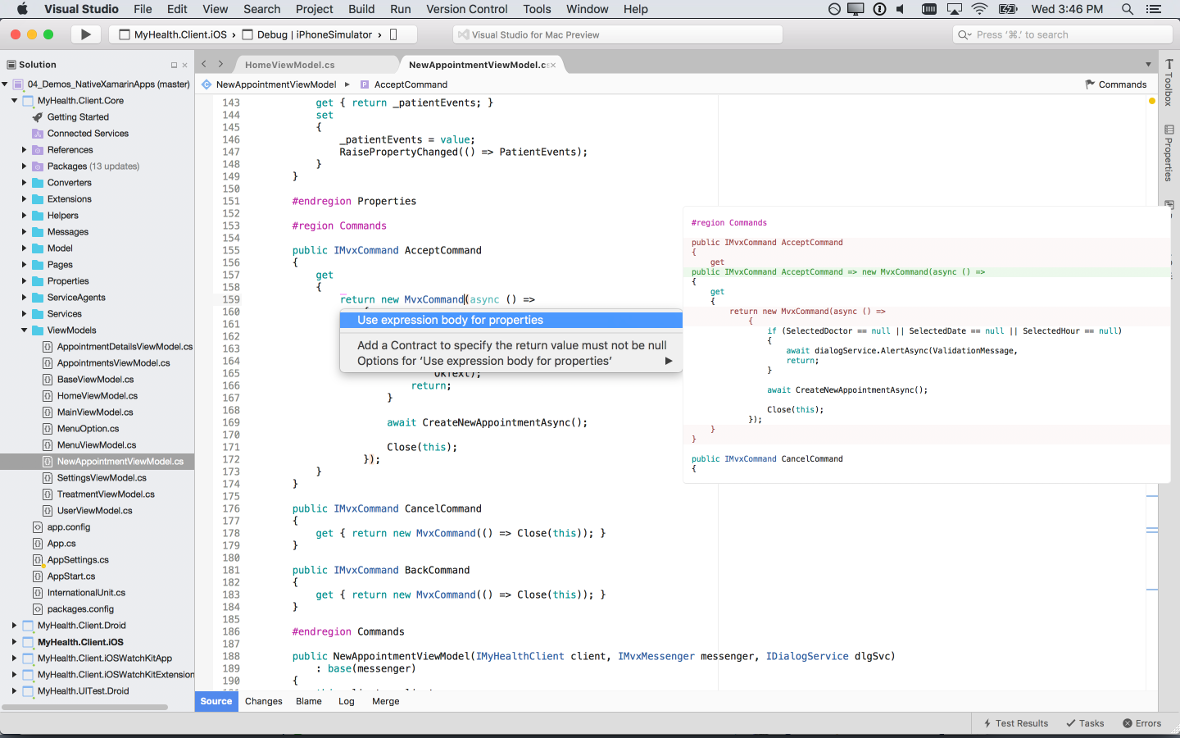Thanks to integration with Xamarin, a cross-platform software development company that Microsoft acquired last year, Visual Studio encourages macOS and iOS developers 'to use Microsoft’s development tools, since they will no longer need a Windows computer or virtual machine to do so.' Xamarin Studio is expected to eventually close for good following a full integration into Microsoft.
“Developers get a great IDE and a single environment to not only work on end-to-end solutions — from mobile and web apps to games — but also to integrate with and deploy to Azure,” Scott Guthrie, executive vice president of the Microsoft Cloud and Enterprise group, said in a statement. “Whether you use C#, F#, .NET Core, ASP.NET Core, Xamarin or Unity, you’ll get a best-in-class development environment, natively designed for the Mac.”Visual Studio has been designed natively for macOS, according to Microsoft, letting developers manage their code hosted by any provider, including GitHub and Visual Studio Team Services. Developers can build, connect, and tune native mobile apps for iOS, macOS, and Android while also having the ability to create web applications thanks to support for ASP.NET Core. In terms of programming languages, the C# and F# languages are supported.
There are three different versions of Visual Studio for Mac that users can download, including Visual Studio Community, Visual Studio Professional, and Visual Studio Enterprise. Microsoft markets Community as its free, but 'fully-featured,' IDE for students and individual developers. Professional targets small teams with subscription benefits, while more 'demanding' users and projects with larger scale are suggested to look into Enterprise.
For its cloud subscriptions, there are yearly and monthly options available to users interested in the higher-tier Visual Studio plans. An annual subscription to Visual Studio Professional costs $539/year while a monthly subscription costs $45/month. For Visual Studio Enterprise, users will pay $2,999/year or $250/month. Subscribers will be able to earn small credits back each month for the yearly tiers, contingent on their use of different Azure services.
For a detailed breakdown of the differences between each Visual Studio subscription, including individual licenses, check out the app's new website.
Guides
Upcoming
Front Page Stories
Bloomberg: 2019 iPhones Will Have Centered Apple Logo on Back
What to Expect at Apple's September 2019 Event: New iPhones, Apple Watch Models, Services Updates and More
1 day ago on Front PageApple to Live Stream September 10 Event on YouTube
1 day ago on Front PageU.S. Government Orders Apple and Google to Identify Users of a Gun Scope App
1 day ago on Front PageFifth Avenue Glass Cube Gets Temporary Rainbow Look to Celebrate Reopening
1 day ago on Front PageApple Disputes Some Details of Google's Project Zero Report on iOS Security Vulnerabilities [Updated]
1 day ago on Front PageKuo: 'Apple Tags' to Feature Ultra-Wideband Technology, Likely Far More Precise Than Tile's Trackers
1 day ago on Front PageApple Working on Siri Feature Allowing Back-and-Forth Conversations About Health Problems
1 day ago on Front Page
Visual Studio 2017 for Mac Support for macOS/OS X Development Visual Studio 2017 for Mac enables you to build console applications and Cocoa (desktop) applications for macOS. For more information, see macOS development with Visual Studio for Mac. Developers can use Visual Studio 2017 for Mac to create and tune iOS, macOS, and Android apps, and also create web applications thanks to the software's support for ASP.NET Core.
Installation
- Download Visual Studio Code for macOS.
- Double-click on the downloaded archive to expand the contents.
- Drag
Visual Studio Code.appto theApplicationsfolder, making it available in theLaunchpad. - Add VS Code to your Dock by right-clicking on the icon to bring up the context menu and choosing Options, Keep in Dock.
Visual Studio For Mac Download
Launching from the command line
You can also run VS Code from the terminal by typing 'code' after adding it to the path:
- Launch VS Code.
- Open the Command Palette (⇧⌘P (Windows, Linux Ctrl+Shift+P)) and type 'shell command' to find the Shell Command: Install 'code' command in PATH command.
- Restart the terminal for the new
$PATHvalue to take effect. You'll be able to type 'code .' in any folder to start editing files in that folder.

Note: If you still have the old code alias in your .bash_profile (or equivalent) from an early VS Code version, remove it and replace it by executing the Shell Command: Install 'code' command in PATH command.
To manually add VS Code to your path, you can run the following commands:
Start a new terminal to pick up your .bash_profile changes.

Note: The leading slash is required to prevent $PATH from expanding during the concatenation. Remove the leading slash if you want to run the export command directly in a terminal.
Visual Studio Download
Touch Bar support
Out of the box VS Code adds actions to navigate in editor history as well as the full Debug tool bar to control the debugger on your Touch Bar:
Mojave privacy protections
After upgrading to macOS Mojave version, you may see dialogs saying 'Visual Studio Code would like to access your {calendar/contacts/photos}.' This is due to the new privacy protections in Mojave and is not specific to VS Code. The same dialogs may be displayed when running other applications as well. The dialog is shown once for each type of personal data and it is fine to choose Don't Allow since VS Code does not need access to those folders. You can read a more detailed explanation in this blog post.
Updates
VS Code ships monthly releases and supports auto-update when a new release is available. If you're prompted by VS Code, accept the newest update and it will get installed (you won't need to do anything else to get the latest bits).
Note: You can disable auto-update if you prefer to update VS Code on your own schedule.
Preferences menu
You can configure VS Code through settings, color themes, and custom keybindings and you will often see mention of the File > Preferences menu group. On a macOS, the Preferences menu group is under Code, not File.
Visual Studio 2010 For Mac Os X Download
Next steps
Once you have installed VS Code, these topics will help you learn more about VS Code:
- Additional Components - Learn how to install Git, Node.js, TypeScript, and tools like Yeoman.
- User Interface - A quick orientation around VS Code.
- User/Workspace Settings - Learn how to configure VS Code to your preferences settings.
Common questions
X Code
Why do I see 'Visual Studio Code would like access to your calendar.'
If you are running macOS Mojave version, you may see dialogs saying 'Visual Studio Code would like to access your {calendar/contacts/photos}.' This is due to the new privacy protections in Mojave discussed above. It is fine to choose Don't Allow since VS Code does not need access to those folders.